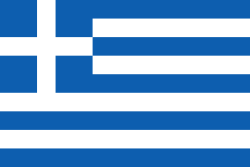| Greece in the Junior Eurovision Song Contest | |
|---|---|
| Junior Eurovision Song Contest | |
 | |
| Participating broadcaster | Hellenic Broadcasting Corporation (ERT) |
| Participation summary | |
| Appearances | 6 |
| First appearance | 2003 |
| Last appearance | 2008 |
| Highest placement | 6th: 2005 |
Participation history
| |
| External links | |
| Greece's page at JuniorEurovision.tv | |
Greece has been represented at the Junior Eurovision Song Contest six times, entering at the first contest in 2003. The Greek participating broadcaster in the contest is Hellenic Broadcasting Corporation (ERT). Its first entry was "Fili gia panta" by eight-year-old Nicolas Ganopoulos, which came eighth. Its best entry was in 2005 when "Tora einai i seira mas" by Alexandros and Kalli placed sixth, while its worst result was in 2007, when "Made in Greece" placed 17th (last) with 14 points. ERT has not taken part in the contest since 2008.